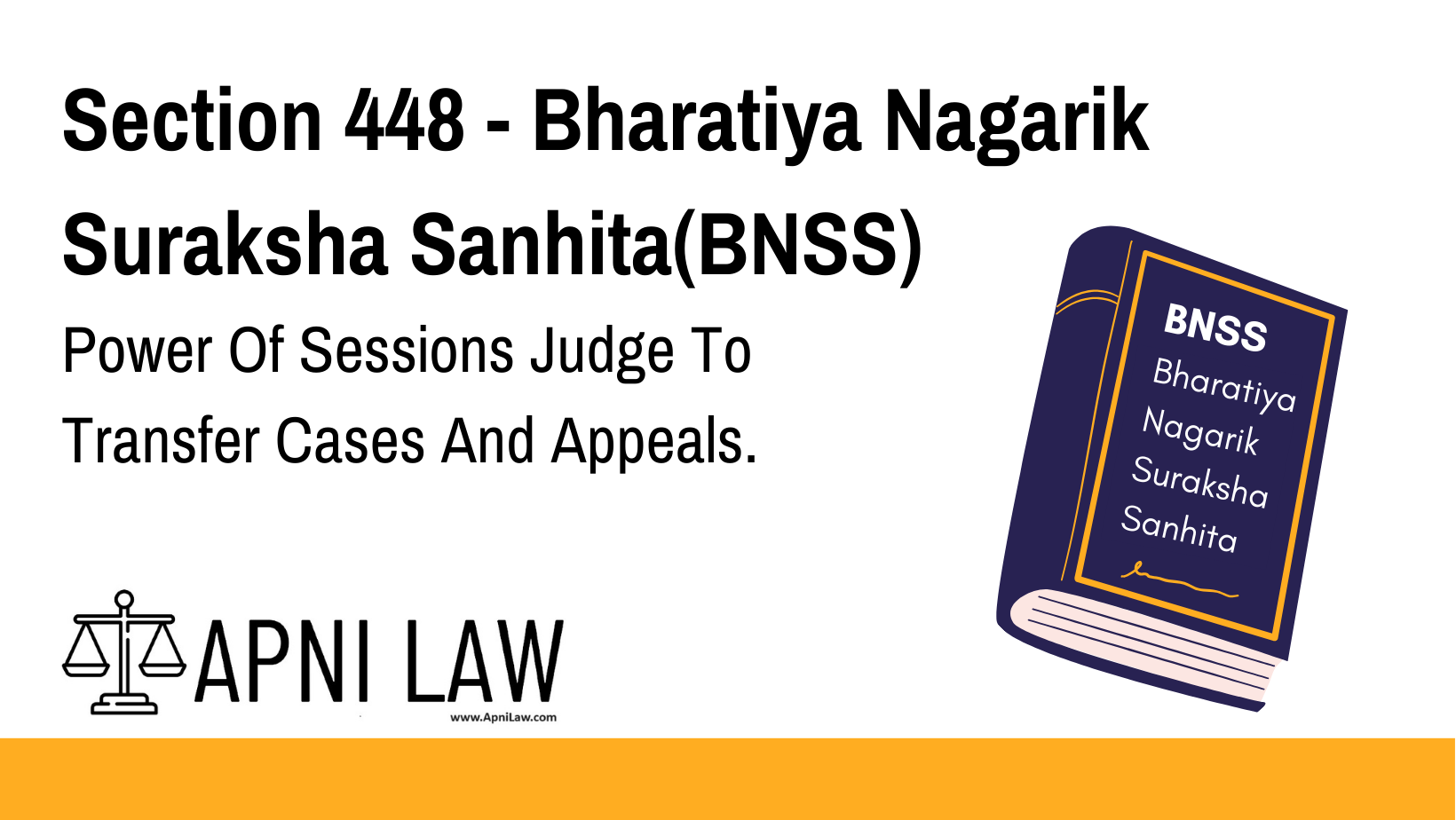Code: Section 448 BNSS
(1) Whenever it is made to appear to a Sessions Judge that an order under this
sub-section is expedient for the ends of justice, he may order that any particular case be
transferred from one Criminal Court to another Criminal Court in his sessions division.
(2) The Sessions Judge may act either on the report of the lower Court, or on the
application of a party interested, or on his own initiative.
(3) The provisions of sub-sections (3), (4), (5), (6), (7) and (9) of section 447 shall
apply in relation to an application to the Sessions Judge for an order under sub-section (1)
as they apply in relation to an application to the High Court for an order under
sub-section (1) of section 447, except that sub-section (7) of that section shall so apply as
if for the word “sum” occurring therein, the words “sum not exceeding ten thousand rupees”
were substituted.
Explanation of Section 448 BNSS
Section 448 of the Bharatiya Nagarik Suraksha Sanhita (BNSS), 2023 grants Sessions Judges the authority to transfer criminal cases within their sessions division to ensure fair trials and justice.
Key Provisions
1. When Can the Sessions Judge Transfer a Case?
The Sessions Judge may order a transfer when:
✅ A fair trial is not possible in the current court.
✅ The transfer is necessary for justice.
✅ The case involves procedural or administrative convenience.
2. Who Can Request a Transfer?
🔹 The lower court (by submitting a report).
🔹 An interested party (accused, complainant, or prosecution).
🔹 The Sessions Judge himself (acting suo motu).
3. Conditions for Transfer Applications
✔️ The provisions of Section 447 BNSS apply, meaning:
- Applications must be supported by an affidavit.
- Accused persons may be required to execute a bond.
- Public Prosecutor must be notified at least 24 hours before the hearing.
4. Compensation for Frivolous Applications
If an application for transfer is deemed frivolous or vexatious, the Sessions Judge may impose a fine up to ₹10,000 on the applicant, as per the modified provision of Section 447(7) BNSS.
Illustrations of Section 448 BNSS
Example 1: Transfer for Fair Trial
A person accused of theft in District Court A fears that local influences may affect the trial. The Sessions Judge transfers the case to District Court B within the same division.
Example 2: Administrative Transfer
A court is overburdened with pending cases, causing delays. The Sessions Judge transfers some cases to another less crowded court for faster resolution.
Example 3: Frivolous Transfer Request
A defendant files multiple unnecessary transfer applications to delay the trial. The Sessions Judge rejects the request and imposes a ₹10,000 penalty.
Common Questions and Answers on Section 448 BNSS
1. Can a Sessions Judge transfer a case outside his jurisdiction?
❌ No, a Sessions Judge can only transfer cases within his sessions division. For transfers outside, an application must be made to the High Court under Section 447 BNSS.
2. How is a case transferred under Section 448 BNSS?
✔️ A request must be made by the lower court, an interested party, or the Sessions Judge himself.
✔️ If an accused applies, they may need to provide a bond.
✔️ The Public Prosecutor must be informed 24 hours before the hearing.
3. What happens if a transfer application is frivolous?
🔹 The Sessions Judge may reject the application.
🔹 A fine of up to ₹10,000 may be imposed on the applicant.
4. Can an accused request a case transfer?
✅ Yes, but they may need to provide a bond and must notify the Public Prosecutor in advance.
Conclusion
Section 448 BNSS empowers Sessions Judges to transfer cases within their jurisdiction to ensure fair trials and efficiency. This provision helps prevent bias, influence, and delays in criminal trials.
For expert legal insights, visit ApniLaw today! 🚀











